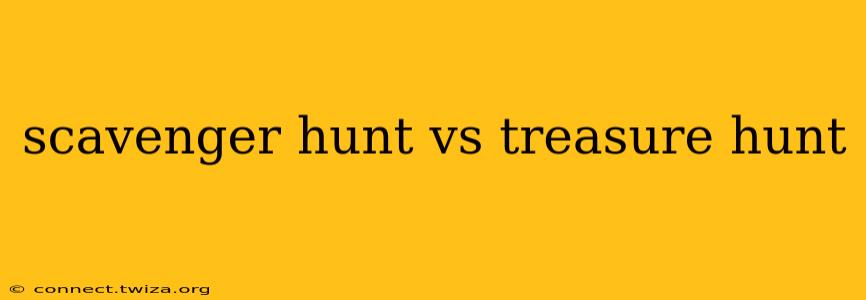Are scavenger hunts and treasure hunts the same thing? While both involve searching for hidden items, there are key distinctions that make each a unique and exciting experience. This guide will explore the core differences, helping you choose the perfect adventure for your next event.
What is a Scavenger Hunt?
A scavenger hunt is a game where participants follow a series of clues to find hidden objects or locations. These clues can be riddles, puzzles, photos, or even coordinates. The focus is less on the final prize and more on the journey and problem-solving involved in deciphering the clues. The items found are often diverse and not necessarily valuable; they might be everyday objects, photos, or even small tasks to complete. The emphasis is on the process of finding things.
What is a Treasure Hunt?
A treasure hunt, on the other hand, usually culminates in the discovery of a single, valuable prize – the "treasure." The clues are typically designed to lead participants towards a specific, pre-determined location containing the treasure. While puzzles and riddles can still be incorporated, the ultimate goal is uncovering the hidden prize, making the destination the main focus.
What are the Key Differences Between a Scavenger Hunt and a Treasure Hunt?
Here's a table summarizing the key differences:
| Feature | Scavenger Hunt | Treasure Hunt |
|---|---|---|
| Goal | Finding multiple items or locations | Finding a single, valuable prize (the treasure) |
| Clues | Diverse, can be riddles, puzzles, photos, etc. | Typically lead to a specific location |
| Prize | Often less valuable, or symbolic | Usually a significant, valuable prize |
| Focus | The process of finding and solving clues | The destination and discovery of the treasure |
| Complexity | Can range from simple to extremely complex | Can range from simple to extremely complex |
H2: What are some examples of clues used in scavenger hunts and treasure hunts?
Both scavenger and treasure hunts utilize creative clues to guide participants. Scavenger hunts might use riddles like, "I have cities, but no houses; forests, but no trees; and water, but no fish. What am I? (A map)," leading to a map revealing the next clue's location. Treasure hunts might employ a more narrative approach, with each clue revealing a piece of a story that ultimately leads to the treasure's hiding place. For example, "The pirate's first stop was where the sun kissed the waves at dawn," leading to a beach.
H2: How do I choose between a scavenger hunt and a treasure hunt?
The best choice depends on your goals and the type of experience you want to create. Consider the following:
- Age group: Scavenger hunts are often better suited for younger children, as they offer a more flexible and less pressure-filled experience.
- Time commitment: Scavenger hunts can be designed to take longer, offering a more extended adventure.
- Desired outcome: If you want to focus on problem-solving and teamwork, a scavenger hunt is ideal. If the emphasis is on the excitement of finding a valuable prize, then a treasure hunt is more appropriate.
- Location: Both can be adapted to various locations, but the type of clues used will often be influenced by the environment.
H2: Can I combine elements of both a scavenger hunt and a treasure hunt?
Absolutely! You can design a hybrid event that incorporates aspects of both. For instance, a series of scavenger hunt clues could ultimately lead to the location of a significant treasure. This approach offers the best of both worlds, combining problem-solving with the thrill of uncovering a valuable prize.
By understanding the key differences between scavenger hunts and treasure hunts, you can craft an unforgettable adventure tailored to your specific needs and preferences. Remember to prioritize creativity and fun – the most important ingredient in any successful hunt!
